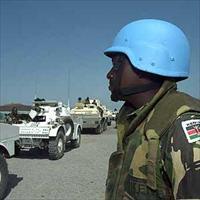SOMALIA: Extension of peace mission's mandate not enough, says government

Somalia's transitional government has welcomed a resolution by the UN Security Council authorising a six-month extension for African Union (AU) peacekeepers but said more needed to be done to restore peace and stability to the war-torn country.
"The government of course welcomes the extension but the UN Security Council decision does not go far enough," Abdi Haji Gobdon, the government spokesman, told IRIN on 21 February. "Only a much stronger and robust UN force can make a difference to the Somali situation."
He said that given the country's state of insecurity, the small AU force would not be able to help in stabilisation efforts.
Gobdon said the government hoped the Council, in its next meeting on Somalia, "will take the extra step and approve a UN force if they are serious about helping Somalis".
On 20 February, the UN Security Council extended the mandate of the AU mission, known as African Mission in Somalia (AMISOM), for six months.
According to UN News, the Council urged AU member states to contribute to the mission, “to help facilitate the full withdrawal of other foreign forces from Somalia and help create the conditions for lasting peace and stability there”.
Established in February 2007, AMISOM is mandated to provide protection to the Transitional Federal Institutions (TFIs), to help them carry out their functions of government, and to provide security for key infrastructure.
The Council is expected to meet again after the release of UN Secretary-General Ban Ki-moon’s report on the country on 10 March.
Initially, AMISOM was to have comprised 8,000 troops, but only 1,600 Ugandan and 200 Burundian soldiers have so far been deployed.
Somali civil society groups said the extension was "of little value".
"Extending this mission will not help the people of this country," a member of civil society in Mogadishu, who requested anonymity, said. "They have been here over six months. In that time over one million people have been displaced, thousands killed or injured and what have they done? Nothing."
She said the deployment of any force would not make a difference, "as long as there is no genuine political process of reconciliation and dialogue".
According to the UN, an estimated two million people in Somalia are facing a humanitarian crisis.
Civil society sources say at least 6,000 people have reportedly been killed in the fighting in the capital, Mogadishu, between Ethiopian-backed government forces and insurgents, and at least 700,000 displaced.
 Back and Next - Back and Next
Back and Next - Back and Next See Also - See Also
See Also - See Also